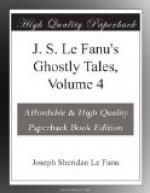I need hardly say, how absolute was the faith of the honest inhabitants, at the time when I heard the story, in the reality of the preternatural summons which, through the portals of terror, sickness, and misery, had summoned Bully Larkin to his long, last home, and that, too, upon the very ground on which he had signalised the guiltiest triumph of his violent and vindictive career.
I recollect another story of the preternatural sort, which made no small sensation, some five-and-thirty years ago, among the good gossips of the town; and, with your leave, courteous reader, I shall relate it.
The Sexton’s Adventure
Those who remember Chapelizod a quarter of a century ago, or more, may possibly recollect the parish sexton. Bob Martin was held much in awe by truant boys who sauntered into the churchyard on Sundays, to read the tombstones, or play leap frog over them, or climb the ivy in search of bats or sparrows’ nests, or peep into the mysterious aperture under the eastern window, which opened a dim perspective of descending steps losing themselves among profounder darkness, where lidless coffins gaped horribly among tattered velvet, bones, and dust, which time and mortality had strewn there. Of such horribly curious, and otherwise enterprising juveniles, Bob was, of course, the special scourge and terror. But terrible as was the official aspect of the sexton, and repugnant as his lank form, clothed in rusty, sable vesture, his small, frosty visage, suspicious grey eyes, and rusty, brown scratch-wig, might appear to all notions of genial frailty; it was yet true, that Bob Martin’s severe morality sometimes nodded, and that Bacchus did not always solicit him in vain.
Bob had a curious mind, a memory well stored with “merry tales,” and tales of terror. His profession familiarized him with graves and goblins, and his tastes with weddings, wassail, and sly frolics of all sorts. And as his personal recollections ran back nearly three score years into the perspective of the village history, his fund of local anecdote was copious, accurate, and edifying.
As his ecclesiastical revenues were by no means considerable, he was not unfrequently obliged, for the indulgence of his tastes, to arts which were, at the best, undignified.
He frequently invited himself when his entertainers had forgotten to do so; he dropped in accidentally upon small drinking parties of his acquaintance in public houses, and entertained them with stories, queer or terrible, from his inexhaustible reservoir, never scrupling to accept an acknowledgment in the shape of hot whiskey-punch, or whatever else was going.
There was at that time a certain atrabilious publican, called Philip Slaney, established in a shop nearly opposite the old turnpike. This man was not, when left to himself, immoderately given to drinking; but being naturally of a saturnine complexion, and his spirits constantly requiring a fillip, he acquired a prodigious liking for Bob Martin’s company. The sexton’s society, in fact, gradually became the solace of his existence, and he seemed to lose his constitutional melancholy in the fascination of his sly jokes and marvellous stories.




